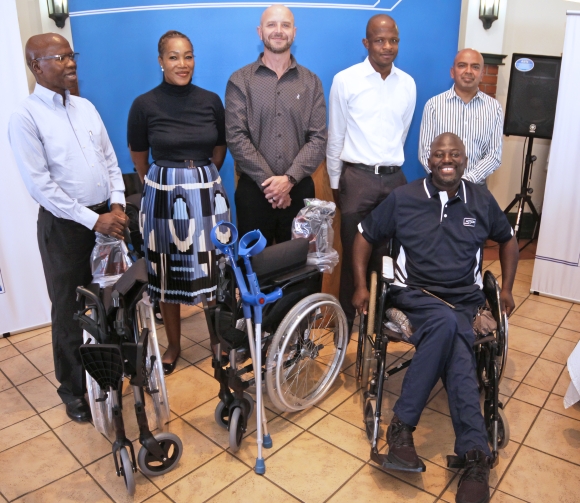ACTOM has launched a bold new skills training initiative to assist people living with disabilities to make ends meet and earn enough to support themselves and their families.
The new initiative, launched in March this year, is a continuation of the socio-economic development (SED) drive ACTOM introduced last year when it recruited 20 young women from squatter camps in the vicinity of the group’s main factory site in Knights, Germiston, to receive training in a variety of trade skills with the aim of earning a living by them.

“The new business development initiative is focussed on skilling up and helping to provide work and business opportunities to people living with disabilities, who are especially in need of assistance because their physical handicaps place them at a disadvantage in getting work compared with able-bodied people seeking employment,” commented Group Human Capital Director Sylvester Makamu, who heads ACTOM’s SED programme.
“Quite a lot of businesses and individuals who have work opportunities to offer have a prejudice against people with disabilities and automatically view them as being incapable of rendering services needed. This is unfair. Yes, they are of course less able than able-bodied people, but it is only to the extent that their specific condition handicaps them.
“In fact, we have found that the majority of people with disabilities are strongly motivated to work and keen to learn,” Sylvester stressed.
How to find adults with disabilities in local disadvantaged communities initially posed a problem for Sylvester. But he was in luck: One day while driving to one of ACTOM’s business units on the East Rand he stopped and spoke to two women on crutches he spotted at the side of the road. They put him in touch with Gabriel Rampya, 50, a disabled man living in Alexandra township who had helped them and others like them living in Alexandra and townships in Ekurhuleni to get work.
Through Gabriel’s many contacts, two HR Managers conducted interviews and assisted Sylvester to select a group of 20 suitable candidates – 10 women and 10 men – based on the criteria that were in use to check suitability for supply chain related duties, to participate in the new training initiative.
“ACTOM is funding the business management skills training courses for them, with specific focus on procurement/supply chain, at a qualified training institution, along with covering transport and other expenses associated with this,” Sylvester pointed out.
“As part of that training they will also be given workplace integrated learning to prepare them for entrepreneurship with specific focus on supply chain based on the procurement needs of ACTOM,” he stated.
A Midrand-based business training college has been signed on by ACTOM to provide the business management training at its premises for a full working week of five days each month for 12 months – the first of these one-week-per-month set of courses having been held in April.
The courses cover the whole gamut of business management skills in detail, ranging from management principles, processes and operations to marketing and selling, as well as covering pricing and costing, communication fundamentals and mathematical literacy.
“A major part of the training will be concentrated on the various skills required to launch and run your own business, because we view this as a more realistic scenario right now in South Africa, with its appallingly high unemployment levels, than being wholly dependent on finding existing businesses willing and able to take on newly-trained people as employees,” Sylvester explained.
A second key service provider, a Midrand-based specialist project management company, is charged with the responsibility of arranging transport for the trainees from their homes to the training college and back again on training days, as well as ensuring that they are provided with an adequate meal on each of those days, plus dealing with other situations relating to the trainees’ needs as they arise during those periods. This company will also take full responsibility for the payroll duties whereby the participating trainees are paid monthly allowances for their own upkeep for the duration of the SED programme.
